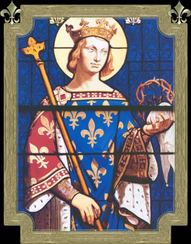
In May, 1234, Louis, then twenty, married Margaret, the oldest daughter of Raymond Beranger, Count of Provence. They had eleven children, five sons and six daughters. This line continued in power in France for five hundred years. In 1793, as the guillotine fell on Louis XVI, it will be recalled that the Abbe Edgeworth murmured: "Son of St. Louis, ascend to Heaven!"
After taking the government of the realm into his hands, one of the young King's first acts was to build the famous monastery of Royaumont, with funds left for the purpose by his father. Louis gave encouragement to the religious orders, installing the Carthusians in the palace of Vauvert in Paris, and assisting his mother in founding the convent of Maubuisson. Ambitious to make France foremost among Christian nations, Louis was overjoyed at the opportunity to buy the Crown of Thorns and other holy relics from the Eastern Emperor at Constantinople. He sent two Dominican friars to bring these sacred objects to France, and, attended by an impressive train, he met them at Sens on their return. To house the relics, he built on the island in the Seine named for him, the shrine of Sainte-Chapelle, one of the most beautiful examples of Gothic architecture in existence. Since the French Revolution it stands empty of its treasure.
Louis loved sermons, heard two Masses daily, and was surrounded, even while traveling, with priests chanting the hours. Though he was happy in the company of priests and other men of wisdom and experience, he did not hesitate to oppose churchmen when they proved unworthy. The usual tourneys and festivities at the creation of new knights were magnificently celebrated, but Louis forbade at his court any diversion dangerous to morals. He allowed no obscenity or profanity. "I was a good twenty-two years in the King's company," writes Joinville, "and never once did I hear him swear, either by God, or His Mother, or His saints. I did not even hear him name the Devil, except if he met the word when reading aloud, or when discussing what had been read." A Dominican who knew Louis well declared that he had never heard him speak ill of anyone. When urged to put to death the rebel son of Hugh de la Marche, he would not do so, saying, "A son cannot refuse to obey his father's orders."
On a crusade in in 1270, dysentery and other diseases broke out among the crusaders, and Louis' second son, who had been born at Damietta during the earlier crusade, died. That same day the King and his eldest son, Philip, sickened, and it was soon apparent that Louis would not recover. He was speechless all the next morning, but at three in the afternoon he said, "Into Thy hands I commend my spirit," and quickly breathed his last. His bones and heart were taken back to France and kept enshrined in the abbey-church of St. Denis, until they were scattered at the time of the Revolution. Louis was strong, idealistic, austere, just; his charities and foundations were notable, and he went on two crusades. Little wonder that a quarter of a century after his death the process of canonization was started and quickly completed the man who was "every inch a king" became a saint of the Church in 1297, twenty-seven years after his death.
To his son he gave these words "Fair son, the first thing I would teach thee is to set thine heart to love God; for unless he love God none can be saved. Keep thyself from doing aught that is displeasing to God, that is to say, from mortal sin. Contrariwise thou shouldst suffer every manner of torment rather than commit a mortal sin.
"If God send thee adversity, receive it in patience and give thanks to our Saviour and bethink thee that thou hast deserved it, and that He will make it turn to thine advantage. If He send thee prosperity, then thank Him humbly, so that thou becomest not worse from pride or any other cause, when thou oughtest to be better. For we should not fight against God with his own gifts.
"Confess thyself often and choose for thy confessor a right worthy man who knows how to teach thee what to do, and what not to do; and bear thyself in such sort that thy confessor and thy friends shall dare to reprove thee for thy misdoings. Listen to the services of Holy Church devoutly, and without chattering; and pray to God with thy heart and with thy lips, and especially at Mass when the consecration takes place. Let thy heart be tender and full of pity toward those who are poor, miserable, and afflicted, and comfort and help them to the utmost of thy power."




